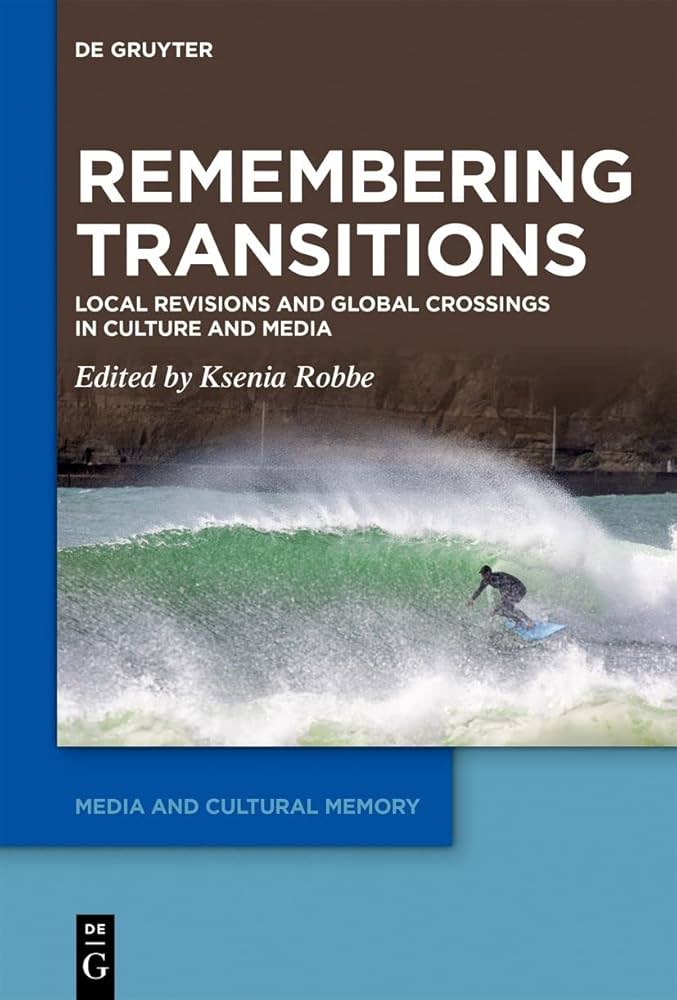Bridging past and present: A critical exploration of transition memories

Published by: De Gruyter

This edited volume curated by Ksenia Robbe explores the mediated recollections of the sociopolitical and economic transitions of the late twentieth century across post-socialist, post-apartheid, and post-dictatorship contexts. It takes as its starting point the idea that transitions serve as markers of moral, political, narrative, and visual orientation in processes of identity- and nation-building (pp. 6-7). This undeniable relevance of transition memories prompts the volume to examine the narratives, local and global dynamics, frameworks, and meanings of these memories, while critically questioning the instrumentalization of the past in present-day political discourse. In this manner, the volume builds a bridge between past and present, memories and visions, and historical and contemporary crises, shifts, and conflicts.
The contributions to this volume take a dual perspective: The chapters in the first section, “Transitions’ Working Memories”, examine the (hegemonic and counter-hegemonic) modes of memory that have developed during political transitions and focus on their impact on present-day memory cultures. The essays in the second section, “Reworking Memories of Transitions”, explore the practices of revisiting the transitions from a contemporary perspective, which also involves re-writing and re-telling earlier narratives and imaginaries, as well as the emergence of alternative perspectives and modes.
The volume encompasses a diverse range of cases from societies and countries that experienced transitions from regimes marked by authoritarian control and widespread state- sanctioned repressions (including state socialist governments, military dictatorships, and colonial and apartheid regimes) during the late 1970s to the early 1990s. Accordingly, the geographical scope of the contributions is broad, examining the interplay between local and global dimensions of transitions as well as the possibilities and limits of “translatability” concerning regimes that, while all authoritarian, differed significantly – or were even opposites – in their economic structures and ideologies. The geography of the contributions spans from Romania and Hungary to Spain, Portugal, and Greece, to Argentina and Uruguay, and from South Africa to Taiwan and Russia.
The volume addresses a wide variety and ambiguity of post-transitional moods and memories: from the euphoria of new beginnings and hopes for democratization and better socioeconomic opportunities along with new freedoms, to conflicts and even violence, as well as feelings of betrayal, disillusionment, disorientation, insecurity, disappointment, and melancholy, encompassing complex emotions that span and transcend trauma and nostalgia. The volume captures the complexity of transition processes in their “dialectic of ends and beginnings, of hoped-for possibilities and their foreclosures” (p. 3). It addresses both the dominant (hegemonic) narratives and their political instrumentalization by state authorities or commercial exploitation by the market, as well as counter-memories by political activists and civil society that have been silenced, erased, or overwritten because they fall outside a “usable past”. Furthermore, the essays in this book explore the “tensions between the openings and closures of memory” (p. 7) and, in doing so, pave the way for a deeper and more nuanced understanding of how certain sociohistorical imaginaries of the past emerge, circulate, and impact present-day memory cultures.
Portraying the past as a struggle between good and evil, victims and perpetrators, establishes frameworks that overlook the complexity and uniqueness of mnemonic processes and erase their specificities.
It is particularly commendable that the volume adopts an explicitly cross-border, comparative and transnational perspective, highlighting “parallels and variations that are rarely reflected upon” (p. 5), without losing sight of the unique characteristics of individual societies and regions, as well as “the specificity of local political and mnemonic processes” (p. 5). Ksenia Robbe excels at placing these diverse regional and global(ized) memory frameworks and practices in dialogue with each other, adopting a critical perspective through the method of “counter-mapping”.
To illustrate this critical perspective with a selected example: The anthology scrutinizes “the human rights-centered mnemonic regime” (p. 10), which emphasizes state violence, secret police, and the suffering of victims. This ethically uncontroversial and potentially empowering remembering is, upon closer examination, not free from “colonial undertones” and can have “counter-democratic effects” (p. 10): Portraying the past as a struggle between good and evil, victims and perpetrators, establishes frameworks that overlook the complexity and uniqueness of mnemonic processes and erase their specificities. Furthermore, this memory regime serves to legitimize and stabilize specific political and economic orders, such as liberal democracy and neoliberal capitalism. The volume advocates for examining memories of transitions “in their complexity, contradictions, and global entanglements to yield more open, non-divisive, and social equality-oriented ways of remembering” (p. 11). Particularly noteworthy in this context is the volume’s ambition not only to portray memories of transitions but also to develop visions for intervening in established frameworks of memory and time. It aims to challenge the hegemonic discourse and counter right-wing populist mnemonic practices, enriching the discussion with new voices, perspectives, and experiences.
The repertoire of media examined in this volume is remarkably diverse. The book provides insights into memory practices in literature (Florin Poenaru, Mónika Dánél, Darwin H. Tsen, Ioana Luca, Cara Levey, Ksenia Robbe), theater (Bonifacio Valdivia Milla and Pablo Valdivia Martin, Luca), film (Dánél, Kostis Kornetis, Luca), music (Kornetis), as well as online magazines (Andrei Zavadski) and social media (Mykola Makhortykh).
The interdisciplinarity of the contributions is also noteworthy – the authors come from a variety of academic disciplines, ranging from Literature and Cultural Studies to Contemporary and Public History, Communication and Media Studies, Area Studies, Sociology, and Anthropology. Each author examines the subject through the lens of their respective field.
Remembering Transitions, positioned as “the first book-length examination of mediated memories of transitions” (pp. 8-9), introduces fresh insights into the extensive research on Cultures of Remembrance in post-transitional and post-authoritarian societies. It offers a conceptual language for (re)thinking and recalling transitions, particularly through the idiom of crisis. Additionally, it is enriching for those seeking approaches and frameworks for researching memory cultures, as it draws on concepts such as “multidirectional” and “agonistic” memory, as well as “mnemonic counterpublics”. This volume offers a range of theoretical, methodological, and conceptual touchpoints for anyone engaged with a topic that has gained significant relevance since the onset of the full-scale invasion of Ukraine by the Russian army.
Daria Gordeeva is a research associate at the Department of Media and Communications at the Ludwig Maximilian University of Munich. In her dissertation, she examined the discursive construction of the GDR and the Soviet Union in German and Russian cinema. Her research focuses on media discourses and audiovisual (especially cinematic) constructions of reality, as well as on memory cultures and the politics of history in an international comparison.
